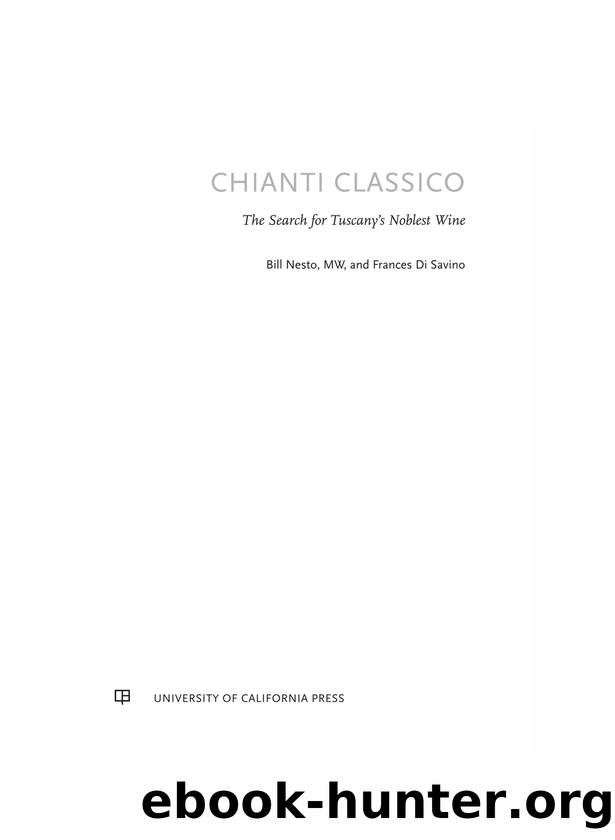Chianti Classico by Bill Nesto

Author:Bill Nesto
Format: epub
ISBN: 9780520284425
Published: 2016-10-05T16:00:00+00:00
ORGANIC AND BIODYNAMIC
During the 1990s, Querciabella in Ruffoli was an early adopter of organic and biodynamic agriculture. Sebastiano Castiglioni was the force behind this change. He brought in Leonello Anello, one of Italyâs first biodynamic consultants, who is now helping the estate to become 100 percent vegan (i.e., abstaining from the use of products derived from animals, such as manure).
Another pioneer in bringing biodynamic viticulture to Chianti Classico is Luca di Napoli. In 1994 he introduced this philosophy and practice to Castello dei Rampolla. There are also less visible champions of the organic and biodynamic movements in Chianti Classico, such as Morganti of Le Boncie, but the pursuit of âoff-roadâ viticultural strategies has been rare in the region.
That is now changing. It began with Panzano. The agronomist Ruggero Mazzilli, in conjunction with Panzanoâs union of winegrowers, the Unione Viticoltori di Panzano in Chianti (UVP), is showing that almost an entire district of winegrowers can work together to become organic. This group was born in 1992, when a cadre of young winemakers joined together to form a lobby. Because they had similar volumes of production and were all interested in producing top-quality wines, they easily found common cause. In 2005 a leafhopper, Scaphoideus titanus, that is a vector of the incurable and deadly vine disease flavescence dorée was discovered in the township of Greve. A ministerial decree of five years earlier obliged the spraying of insecticides in all townships where the vector was present. Treating their vineyards in this manner would have compromised the organic principles of the UVP. Mazzilli, a consultant who specializes in organic viticulture, happened to be in Greve in 2005. The UVP consulted him about the situation. Together with professors from the Universities of Pisa and Florence and the UVP, he set up a program to monitor the insectâs presence in all the vineyards of Panzano and obtained a derogation from the government. The condition for this exception was that if the leafhopper was discovered, insecticides would have to be used. Mazzilli and his wife, Amelia Perego, set up the consulting company SPEVIS (Stazione Sperimentale per la Viticoltura Sostenibile, âExperimental research station for sustainable viticultureâ), which operates a monitoring and research vineyard in coordination with the UVP and informs the government of any sightings of Scaphoideus titanus. As of early 2016, the government has not forced Panzano winegrowers to spray insecticides. Organically farmed vineyards dominate the Panzano landscape. Mazzilli also helps farmers there (at no cost to them) to become organic. When they achieve that goal, they can hire him as their consulting organic agronomist. He also has clients elsewhere in Tuscany and in many other regions of Italy. Mazzilli argues that to be effective from a biological perspective and competitive with conventional farming from a cost perspective, organic practice must involve large areas rather than isolated plots. In 2016 he reported that about 93 percent of Panzanoâs six hundred hectares (1,483 acres) are organic. Zoninâs Castello di Albola in Radda is also consulting him, showing that
Download
This site does not store any files on its server. We only index and link to content provided by other sites. Please contact the content providers to delete copyright contents if any and email us, we'll remove relevant links or contents immediately.
Whiskies (Collins Gem) by dominic roskrow(42184)
101 Whiskies to Try Before You Die by Ian Buxton(42148)
Whiskies Galore by Ian Buxton(40298)
Craft Beer for the Homebrewer by Michael Agnew(17439)
Right Here, Right Now by Georgia Beers(3493)
Not a Diet Book by James Smith(2715)
Water by Ian Miller(2579)
The Coffee Dictionary by Maxwell Colonna-Dashwood(2527)
Kitchen confidential by Anthony Bourdain(2298)
Coffee for One by KJ Fallon(2002)
Smuggler's Cove: Exotic Cocktails, Rum, and the Cult of Tiki by Martin Cate & Rebecca Cate(1977)
Beer is proof God loves us by Charles W. Bamforth(1914)
Superfood Smoothie Bowls: Delicious, Satisfying, Protein-Packed Blends that Boost Energy and Burn Fat by Chace Daniella(1898)
Talking as Fast as I Can by Lauren Graham(1827)
Bourbon: A Savor the South Cookbook by Kathleen Purvis(1786)
A Short History of Drunkenness by Forsyth Mark(1715)
Eat With Intention by Cassandra Bodzak(1684)
Cocktails for the Holidays by Editors of Imbibe magazine(1623)
Colombia Travel Guide by Lonely Planet(1606)
